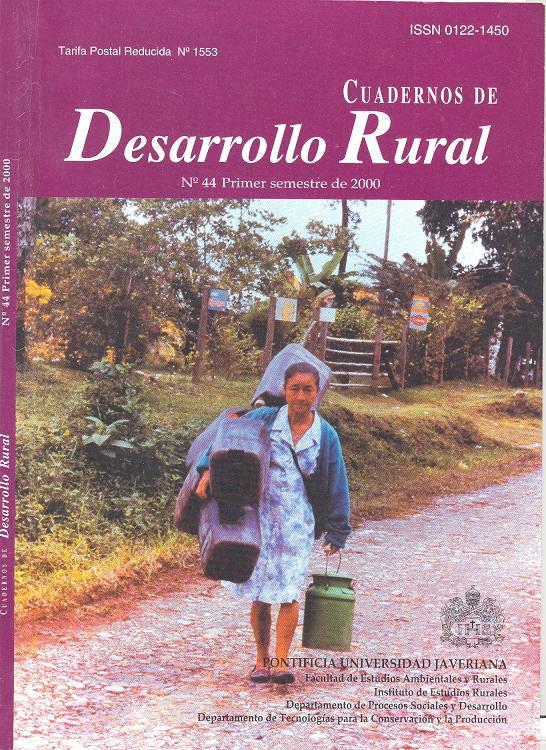Resumen
Mediante investigación participativa con la comunidad, se caracteriza, reconoce y analizala biodiversidad y sostenibilidad de la chagra o sistema de producción indígena del Vaupés(Colombia). Las técnicas con las cuales el indígena se adapta al ambiente e impulsa sudesarrollo, evidencian en la chagra la interacción entre formaciones socioculturales yecosistemas. En ella, el indígena plasma su cosmovisión adquirida a través de procesospermanentes de observación, interacción y diálogo con la naturaleza, mediante los cualesse la apropia y aprende de ella, entendiendo la trama de la vida. Al copiar o replicar lanaturaleza en su biodiversidad, arreglo y dinámica, el indígena hace de su agricultura unverdadero sistema de producción sostenible. Un diálogo permanente de saberes entre elconocimiento indígena y el de la comunidad científica, como proceso de mutuo aprendizaje,permitirá establecer y proponer conjuntamente alternativas de uso, manejo y aprovechamientosostenible de los recursos naturales, para lograr un desarrollo sostenible.Propiedad intelectual Instituto de Estudios Rurales, Facultad de Estudios Ambientales y Rurales, Pontificia Universidad Javeriana, Bogotá, Colombia. El envío de un artículo a la revista Cuadernos de Desarrollo Rural, indica que el(los) autor(es) certifica(n) y acepta(n):
Que éste no ha sido publicado, ni aceptado para publicación en otra revista.
Que en caso de que su publicación haya sido aceptada y el artículo tenga una versión previa como working paper (literatura gris) o aparezca en un sitio web, será retirado del sitio de intemet, en el que se dejará sólo el título, el resumen, las palabras clave y el hipervínculo a la revista.
Que una vez publicado en Cuadernos de Desarrollo Rural no se publicará en otra revista. Al enviar los artículos para su evaluación, el(los) autor(es) acepta(n) que transferirá(n) los derechos de autor a la revista Cuadernos de Desarrollo Rural, a efectos de su publicación en la versión impresa o electrónica, y se firmará la licencia de uso parcial anexa:
Responsabilidad de contenidos El contenido de los artículos publicados por Cuadernos de Desarrollo Rural es de exclusiva responsabilidad del(os) autor(es) y no necesariamente refleja el pensamiento del comité editorial y científico de la revista Cuadernos de Desarrollo Rural. Los textos pueden reproducirse total o parcialmente citando la fuente. La revista Cuadernos de Desarrollo Rural se encuentra registrada bajo la licencia Creative Commons Reconocimiento 4.0 Internacional. Por lo tanto, esta obra se puede reproducir, distribuir y comunicar públicamente en formato digital, siempre que se reconozca el nombre de los autores y a la Pontificia Universidad Javeriana.
Se permite citar, adaptar, transformar, autoarchivar, republicar y crear a partir del material, para cualquier finalidad (incluso comercial), siempre que se reconozca adecuadamente la autoría, se proporcione un enlace a la obra original y se indique si se han realizado cambios. La Pontificia Universidad Javeriana no retiene los derechos sobre las obras publicadas y los contenidos son responsabilidad exclusiva de los autores, quienes conservan sus derechos morales, intelectuales, de privacidad y publicidad. El aval sobre la intervención de la obra (revisión, corrección de estilo, traducción, diagramación) y su posterior divulgación se otorga mediante una licencia de uso y no a través de una cesión de derechos, lo que representa que la revista y la Pontificia Universidad Javeriana se eximen de cualquier responsabilidad que se pueda derivar de una mala práctica ética por parte de los autores. En consecuencia de la protección brindada por la licencia de uso, la revista no se encuentra en la obligación de publicar retractaciones o modificar la información ya publicada, a no ser que la errata surja del proceso de gestión editorial. La publicación de contenidos en esta revista no representa regalías para los contribuyentes.
Cuadernos de Desarrollo Rural is licensed under a Creative Commons Attribution 4.0 International.



